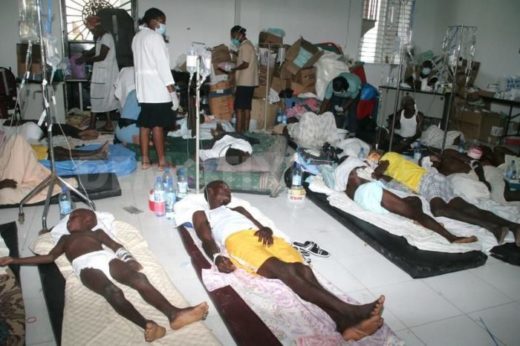The Nigeria Centre for Disease Control, (NCDC) has disclosed that the country has recorded 37,819 suspected cases of cholera, 1,178 deaths in 23 states, and the FCT.
According to the agency, the figures were the position as at Aug. 14.
The NCDC Director-General, Dr. Chikwe Ihekweazu, made the disclosure in an interview with the News Agency of Nigeria (NAN) monitored by Africa Daily News, New York on Monday, in Abuja.
Ihekweazu listed the states to include Benue, Delta, Zamfara, Gombe, Bayelsa, Kogi and Sokoto.
Others are Bauchi, Kano, Kaduna, Plateau, Kebbi, Cross River, Niger, Nasarawa, Jigawa, Yobe, Kwara, Enugu, Adamawa, Katsina, Borno, Taraba and the FCT.
Read Also: Marburg Virus: Nigeria At Low Risk – NCDC
Ihekweazu said that out of the reported cases, 26 percent were aged 5 – 14 years, 51 percent were males and 49 percent were females.
The NCDC boss noted that there had been a decrease in the number of new cases in the last two weeks.
‘Bauchi (773), Niger (284), Zamfara (253) and Katsina (217) account for 78.1 percent of 1,956 cases reported in the last two weeks.
‘Since the beginning of the year, a total of 1,938 samples have been collected with positive cases as follows – 277 Rapid Diagnosis Test (RDT), positive only.
’82 culture-positive; 359 RDT and culture positive. The Test Positivity Rate (TPR) for laboratory confirmation by culture, is 23 percent.
‘No new state reported cases in epi week 31. A total of 770 suspected cases were reported this week representing a 34 per cent decrease, compared to 1,162 suspected cases recorded in week 30,’ he explained.
The DG, however, said that the national multi-sectoral EOC activated at level 2 continues to coordinate the national response.
Africa Daily News, New York understands that Cholera is a waterborne disease, and the risk of transmission is higher when there is poor sanitation and disruption of clean water supply.
The wrong disposal of refuse and practices, such as open defecation endanger the safety of water used for drinking and personal use.
These lead to the spread of water-borne diseases such as cholera. Without proper WASH, Nigeria remains at risk of cholera cases and deaths.
The long-term solution for cholera control lies in access to safe drinking water, maintenance of proper sanitation and hygiene.
Cholera is also preventable and treatable; however, it can be deadly when people who are infected do not access care immediately.
AFRICA DAILY NEWS, NEW YORK










